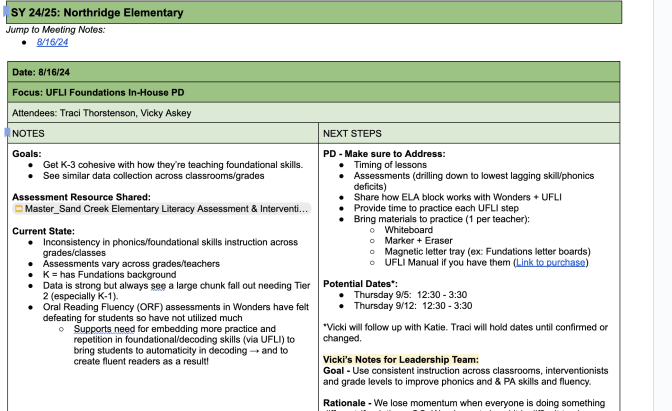QUALITY STANDARD I: Principals demonstrate organizational leadership by strategically developing a vision and mission, leading change, enhancing the capacity of personnel, distributing resources, and aligning systems of communication for continuous school improvement.
Element B: Principals collaborate with staff and stakeholders to implement strategies for change to improve student outcomes.
QUALITY STANDARD II: Principals demonstrate inclusive leadership practices that foster a positive school culture and promote safety and equity for all students, staff, and community.
Element A: Principals create a professional school environment and foster relationships that promote staff and student success and well-being.
Element B: Principals ensure that the school provides an orderly and supportive environment that fosters a sense of safety and well-being.
Element C: Principals commit to an inclusive and positive school environment that meets the needs of all students and promotes the preparation of students to live productively and contribute to the diverse cultural contexts of a global society.
5.09 EL STANDARD I: Educators are knowledgeable about CLD populations.
Element A: Educators are knowledgeable in, understand, and able to apply the major theories, concepts and research related to culture, diversity and equity in order to support academic access and opportunity for CLD student populations.
5.10 EL STANDARD II: Educators should be knowledgeable in first and second language acquisition.
Element B: Educators are knowledgeable of, understand, and able to apply the major theories, concepts and research related to culture, diversity and equity in order to support academic access and opportunity for CLD student populations.
Principal Quality Standard IV: Principals demonstrate professionalism through ethical conduct, reflection, and external leadership.
Element C: Principals build and sustain productive partnerships with key community stakeholders, including public and private sectors, to promote school improvement, student learning, and student well-being.
EL Standard 5.09: Educators are knowledgeable about CLD populations
Element B: Educators are knowledgeable in, understand, and able to use progress monitoring in conjunction with formative and summative assessments to support student learning.
EL Standard 5.10: Educators should be knowledgeable in first and second language acquisition
Element A: Educators are able to understand and implement strategies and select materials to aid in English language and content learning






